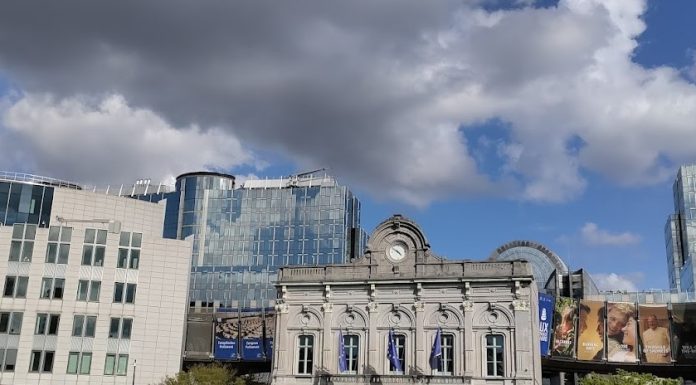Earlier this month, the European Commissionpublished its proposal for a new so-called “anti-coercion instrument” (ACI) to “deter countries from restricting or threatening to restrict trade or investment to bring about a change of policy in the EU in areas such as climate change, taxation or food safety.”
The Commission notes that “this legal instrument is in response to the EU and its Member States becoming the target of deliberate economic pressure in recent years”, as it cites as examples “countries using explicit coercion and trade defence tools against the EU” , “selective border or food safety checks on goods from a given EU country”, as well as “boycotts of goods of certain origin.”
Possible EU “countermeasures” include “imposing tariffs and restricting imports from the country in question”, as well as “restrictions on services or investment” and “steps to limit the country’s access to the EU’s internal market.”
EU strengthens protection against economic coercionhttps://t.co/jKhwFOMx7U
The European Commission has today proposed a new tool to counter the use of economic coercion by third countries…Commission proposal for an Anti-Coercion Instrument: https://t.co/D49PzeTXIo
— ogeltdm (@ogeltdm) December 10, 2021
The obvious backstory here is China stopping imports of Lithuanian goods, in response to Lithuania deepening diplomatic ties with Taiwan. China’s embargo has affected manufactured goods from other EU countries, like France, Germany and Sweden, that are dependent on Lithuanian supply chains. Two German companies in the car manufacturing industry recently saw some parts stopped at Chinese ports because they were manufactured in Lithuania.
Despite this, the issue didn’t feature prominently at last week’s EU Summit in Brussels. EU Trade Commissioner Valdis Dombrovskis has pledged to launch action at the WTO, but given how China’s actions, that are not being officially communicated by Beijing, are in the grey economic zone, and given the lack of a formal trade deal between the EU and China, there isn’t all that much the EU can do. The newly proposed anti-coercion instrument may take years to be agreed.
The episode is yet another illustration of the many difficulties trade with China, a massive economy subject to firm control of the Chinese Communist Party (CCP), continues to throw up.
Shameless 🇨🇳
"A China-based executive told POLITICO that Beijing is putting pressure on EU businesses to stop importing Lithuanian products. Two German companies had parts stopped at Chinese ports because they were manufactured in Lithuania."https://t.co/rQlKp6yBYO
— Elisabeth Braw (@elisabethbraw) December 17, 2021
The French factor
Obviously, ending or severely restricting trade with China simply because of these kinds of political interventions from Beijing, would do more harm than good. Wherever one stands on the issue, it is complex. Even if one is of the opinion that China is an emerging superpower with malign intentions, that does not mean it’s a good idea to end trade with the Middle Kingdom. Trade relations keep people and nations dependent on each other. That doesn’t always work to prevent conflict, as the first World War has demonstrated, but it does represent a factor reducing possible tensions. When goods don’t cross borders, Soldiers will.
Therefore, it’s of the utmost importance to make sure any measures to counter Chinese politicisation of trade are not being diverted to other purposes by the usual suspects favoring protectionism.
Here, France comes into play. With elections coming up in April, the incumbent President, Emmanuel Macron, is reportedly keen to use the French EU Presidency to block progress on EU trade talks with Chile and New Zealand. This follows France exploiting Brexit to push for more “defensive” EU trade policies, which is of course newspeak for “protectionist”.
The excuse is – as always – that trade partners shouldn’t undercut the EU with “laxer” labor and environmental standards. Whether the national and EU policies to protect the environment and workers actually properly realise their intended purpose is thereby a question which is rarely asked. For decades, Europe’s sclerotic welfare state “protection” for workers has protected the jobs of the “insiders” in the labour market, even if they witnessed increased pressure at work, while the “outsiders” witnessed structural high unemployment rates, especially in Latin Europe.
Germany’s “Energiewende” and the EU’s push for renewable energy, linked to skyrocketing prices of CO2 emission certificates, suggest also EU energy and environment policies may not be the best thing since sliced bread, as Europeans are now faced with sky-high energy prices and greater dependence on coal and gas, often imported from Russia, which has never been shy to “weaponise” energy.
Germany is set to close almost half of its nuclear power capacity before the end of the year, putting further strain on European grids already coping with one of the worst energy crunches in the region’s history https://t.co/jBr0OW3Rak
— Bloomberg Energy (@BloombergNRG) December 21, 2021
“Weaponising” trade is, thanks to the French push, something the EU is no longer all that opposed towards. Shiny new EU “trade weapons” include the EU appointing its first-ever chief trade enforcement officer to ensure EU trade partners face sanctions if climate and human rights stipulations in trade deals aren’t met – unsurprisingly, the post went to a Frenchman. A French priority in 2022 will also be to agree the so-called “CBAM” or “Carbon Border Adjustment Mechanism” (“CBAM“), a protectionist external “climate” tariff, which the EU hopes to use to repay the money it borrowed to finance the “recovery fund”. This would involve EU industry – and therefore consumers – being burdened with extra costs for imports, on top of the costs resulting from the increase in energy prices due to the EU’s dysfunctional climate policies. Meanwhile nuclear energy is still not being recognized as a useful energy source to cut CO2 levels, even if this is the supposed reason for all of this.
France wouldn’t be France without a bit of crony capitalism – which, for good understanding, is not something that should be considered capitalism – added to the mix. Not only does France want the EU to restrict food imports from countries that have less stringent rules in terms of the environment, labor and chemicals. Apparently, it is also a priority to push for yet another new EU trade instrument that would be “ensuring global reciprocity in major procurement contracts in sectors from utilities to railways, which has long been a priority for French companies such as Alstom”, as reported by Politico. It’s of course unfortunate that the U.S. and Asian economies tend to be quite protectionist, but these kind of tit-for-tat strategies are likely to backfire, ultimately depriving the EU from investments.
Despite the official claim that France is not against trade, but only wants it to be “fair”, a French official confides behind closed doors that “new trade deals before the French elections are impossible for us because of the domestic political context.” The French freezing of trade deals with Chile and New Zealand already caused irritation in Germany and Spain.
Not just France
It would of course be simplistic to blame only France for the EU’s increasingly “defensive” stance towards trade. A case in point is how the EU is proposing to impose a whole range of restrictions on the import of palm oil products. This is inspired out of concerns for deforestation, but it is shortsighted, given how only a limited part of the global palm oil production is non-sustainable. Also soybean, timber and cattle farming have been linked to deforestation, so the result of these kinds of EU measures would cause companies in the countries concerned making the switch, with no benefit to the environment as a result.
Trying to single out harmful practices is very tricky to do. Instead, it’s better to realise that the problem of deforestation is linked to poverty, inadequate property rights and inadequate enforcement of rules to protect the environment. After all, economic development and care for the environment go hand in hand.
The EU’s brash approach also overlooks the fact that, even though the situation is worrying in certain places, like Brazil and Africa, other countries, particularly in Asia, have successfully developed programs in recent years to slow the trend of deforestation. While in Africa, there was the highest annual rate of net forest loss between 2010 and 2020, with 3.9 million hectares, followed by South America, with 2.6 million hectares, in Asia, we could on the other hand witness the greatest growth in net area between 2010 and 2020, in particular due to the contribution of ambitious reforestation programs in China.
It should be noted that EU policies targeting selected sectors tend to be inspired by media campaigns that do not always provide the public with proper information. When it comes to deforestation, an example is a recent article in The Guardian, which is ideologically situated on the left side of the spectrum.
While covering a new scientific article in Nature, the Guardian carried the headline “Fatty acid found in palm oil linked to spread of cancer”. Only halfway through the article, it was clarified that that the fatty acid in question, palmitic acid, which was highlighted as problematic by Nature, is actually “found in palm oil – but also in a wide variety of foods such as butter and olive oil”. In addition, it’s worth mentioning that palmitic acid is more prevalent in other foods than palm oil. For example, it represents 50 to 60% of total fats in meat and dairy products, compared to only 44% of total fats in palm oil. Yet, The Guardian did not run the headline “Fatty acid found in meat and dairy products linked to spread of cancer”.
Completing the single market as a better alternative
In a noteworthy comment, ECFR scholars Jonathan Hackenbroich and Pawel Zerka highlight how boosting internal EU trade can ultimately serve to counter economic coercion against EU member states:
“Completing the single market – such as by allowing for the liberalisation of services, integrating the digital and the energy markets, or advancing the capital markets union – should also return to the top of the EU’s agenda. A huge, booming, and innovative European market would provide leverage in a world where politics and economics are increasingly intertwined. It would make it more costly to use economic coercion against Europe in the first place. But serious progress on the single market won’t happen so long as discussions are driven mostly by domestic, rather than strategic, considerations.”
Conclusion
Supporting trade under certain conditions, which is what the EU’s ever more defensive stance on trade entails, often comes down to opposing trade altogether. It’s a good idea to provide China with a robust response when it’s pushing around EU member states like Lithuania, and naturally, practices like forced labor – which present a risk in the context of the EU agreement with China – should of course be banned. The EU should however focus on that and it should make sure it doesn’t get dragged along with the agenda of the usual protectionist suspects. By 2024, 85% of global GDP will be generated outside the EU, offering massive opportunities to Europe. By defending itself against politicisation of trade, the EU shouldn’t copy the sins of others.













